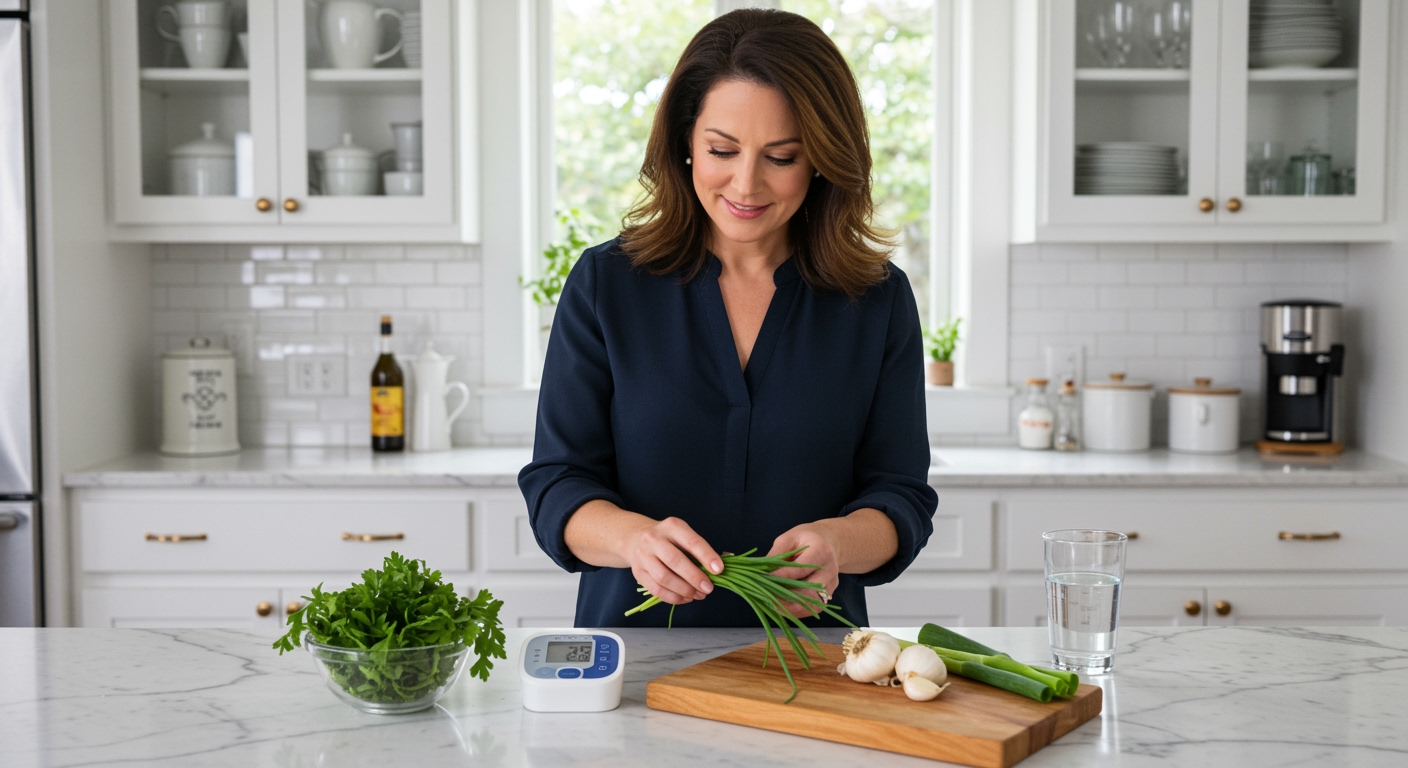✪ Key Takeaway: Chives can lower blood pressure, but dangerous drops are unlikely with normal culinary amounts.
Introduction
You sprinkle chives on your baked potato and wonder if this simple herb could send your blood pressure plummeting.
Many people worry about this because they take blood pressure medications or naturally have low blood pressure already.
Hi, I’m Abdur, your nutrition coach and today I’m going to explain exactly how chives affect your blood pressure and when you should be concerned.
How Do Chives Actually Affect Blood Pressure?
Chives contain sulfur compounds called allicins that can cause mild blood vessel relaxation.
These compounds work similarly to those found in garlic and onions, but in much smaller concentrations.
When your blood vessels relax slightly, your blood pressure can drop by a few points.
Research shows that allium vegetables like chives may reduce systolic pressure by 2-5 mmHg in some people.
However, this effect is gradual and mild compared to prescription medications.
Your body also adapts to regular chive consumption, so the blood pressure effect often diminishes over time.
✪ Fact: One tablespoon of fresh chives contains only trace amounts of active sulfur compounds.
Can Normal Amounts of Chives Cause Dangerous Blood Pressure Drops?
The amount of chives you typically eat in cooking is extremely unlikely to cause dangerous blood pressure drops.
Most recipes call for one to three tablespoons of chopped chives, which contains minimal active compounds.
Even people with naturally low blood pressure can usually consume normal culinary amounts without problems.
Dangerous hypotension from food sources typically requires consuming massive quantities that would be impractical in real life.
For perspective, you would need to eat several cups of concentrated chive extract to see significant blood pressure changes.
Your digestive system also breaks down and processes these compounds gradually, preventing sudden dramatic effects.
✪ Pro Tip: Start with small amounts of chives if you have concerns about blood pressure sensitivity.
Who Should Be More Careful With Chives?
People taking blood pressure medications should monitor their response to increased chive consumption.
ACE inhibitors, beta blockers, and diuretics can potentially interact with the mild hypotensive effects of chives.
Those with chronic hypotension below 90/60 mmHg should also pay attention to their symptoms.
If you experience dizziness, fatigue, or lightheadedness after eating chive-heavy meals, reduce your intake.
People scheduled for surgery should avoid large amounts of chives for two weeks beforehand.
The mild blood-thinning properties combined with anesthesia could theoretically cause complications.
Pregnant women with gestational hypertension should discuss chive consumption with their healthcare provider.
✪ Note: Always inform your doctor about significant dietary changes when taking blood pressure medications.
What Are the Warning Signs to Watch For?
Symptoms of excessive blood pressure drops include sudden dizziness when standing up.
You might also experience unusual fatigue, blurred vision, or feeling faint after meals.
Nausea and cold, clammy skin can indicate that your blood pressure has dropped too significantly.
These symptoms are more likely related to medication interactions than chives alone.
If you notice these signs consistently after eating chive-containing foods, track your intake.
Keep a food diary and note any correlation between chive consumption and symptoms.
Most people can continue enjoying chives in normal amounts without any adverse effects.
✪ Pro Tip: Monitor your blood pressure at home if you have concerns about food-related changes.
How Can You Enjoy Chives Safely?
Start with small amounts and gradually increase your chive consumption over several weeks.
This allows your body to adapt to any mild blood pressure effects naturally.
Eat chives as part of balanced meals rather than consuming them in concentrated forms.
The protein, fats, and carbohydrates in complete meals help moderate the absorption of active compounds.
Stay well-hydrated when increasing your intake of any blood pressure-affecting foods.
Proper hydration helps maintain stable blood pressure and prevents dramatic fluctuations.
Consider timing your chive consumption earlier in the day when you are more active and alert.
✪ Fact: Cooking chives slightly reduces their active compound concentration compared to raw consumption.
The Bottom Line
Chives can mildly lower blood pressure, but dangerous drops from normal culinary amounts are extremely rare.
Smart eating means understanding your body and making informed choices rather than avoiding healthy foods out of fear.
I would love to hear about your experiences with chives and blood pressure in the comments below, and please share any questions you might have.
References
At NutritionCrown, we use quality and credible sources to ensure our content is accurate and trustworthy. Below are the sources referenced in creating this article:





